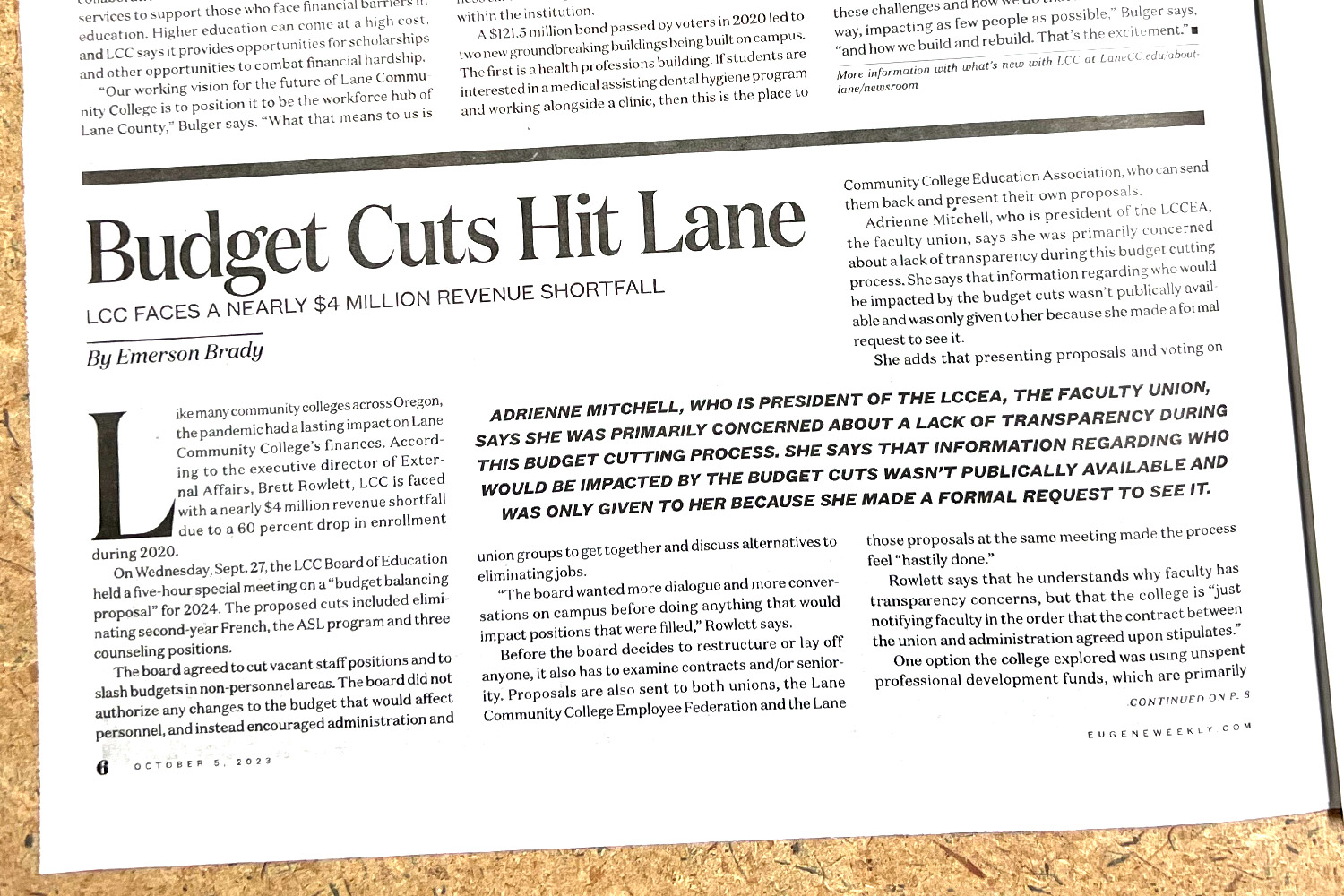Like many community colleges across Oregon, the pandemic had a lasting impact on Lane Community College’s finances. According to the executive director of External Affairs, Brett Rowlett, LCC is faced with a nearly $4 million revenue shortfall due to a 60 percent drop in enrollment over the last decade.
On Wednesday, Sept. 27, the LCC Board of Education held a five-hour special meeting on a “budget balancing proposal” for 2024. The proposed cuts included eliminating second-year French, the ASL program and three counseling positions.
The board agreed to cut vacant staff positions and to slash budgets in non-personnel areas. The board did not authorize any changes to the budget that would affect personnel, and instead encouraged administration and union groups to get together and discuss alternatives to eliminating jobs.
“The board wanted more dialogue and more conversations on campus before doing anything that would impact positions that were filled,” Rowlett says.
Before the board decides to restructure or lay off anyone, it also has to examine contracts and/or seniority. Proposals are also sent to both unions, the Lane Community College Employee Federation and the Lane Community College Education Association, who can send them back and present their own proposals.
Adrienne Mitchell, who is president of the LCCEA, the faculty union, says she was primarily concerned about a lack of transparency during this budget cutting process. She says that information regarding who would be impacted by the budget cuts wasn’t publically available and was only given to her because she made a formal request to see it.
She adds that presenting proposals and voting on those proposals at the same meeting made the process feel “hastily done.”
Rowlett says that he understands why faculty has transparency concerns, but that the college is “just notifying faculty in the order that the contract between the union and administration agreed upon stipulates.”
One option the college explored was using unspent professional development funds, which are primarily used for conferences and training for instructors, to aid the shortfall. Instructors are given professional development funds annually, which help them develop their teaching and their careers, but because of the pandemic, conferences were canceled and funds were rolled over to the next year.
LCC faculty denied the administration request to use their roll-over professional development funds for the shortfall.
“We love the work we do and we want LCC to remain accessible to students throughout the county,” Mitchell says. “But we also want budget decisions to be made in a more transparent manner.”
Right now, Rowlett and LCC President Stephanie Bulger say they are focused on getting enrollment back to the place it was pre-pandemic. Bulger says that this fall, enrollment has gone up by 10 percent and is on track to keep rising.
Increasing enrollment doesn’t mean state funding increases immediately. It will take LCC two to three years to see more money because funding is calculated based on enrollment from the current year and the two years prior. During peak enrollment years, such as after the 2008 Great Recession, LCC received 13 percent of state support, according to Rowlett. Currently, LCC receives 7.8 percent of the state support fund for community colleges.
LCC will be receiving a new state funding package within the next couple of weeks, which Rowlett says should mean a slight increase in funding, but not enough to make a significant dent in the shortfall. “When you have a budget that is 84 percent personnel cost and you have to eliminate 4.4 percent of that budget, it is really hard to do without impacting people,” Rowlett says.
Rowlett says LCC has been described as “the canary in the coal mine” because out of all the community colleges in Oregon, typically LCC’s enrollment increases and decreases first. Bugler and Rowlett say they hope that this increase in enrollment means that other community colleges in Oregon will see an increase as well.
“Hopefully, the good news that we’re experiencing right now signals good news for other Oregon community colleges,” Rowlett says. “I’ll just say ‘hopefully’ — it’s not as good because we need to get our piece of the pie back to where it used to be.”
This story has been updated to reflect that LCC’s enrollment dropped 60 percent over the last decade not during 2020.
